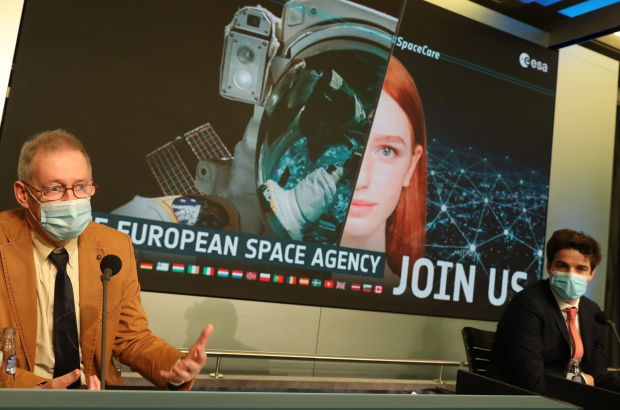- Daily & Weekly newsletters
- Buy & download The Bulletin
- Comment on our articles
European Space Agency launches astronaut recruitment campaign
For the first time in 11 years, the European Space Agency (ESA) is recruiting astronauts. A campaign is being launched in all EU member states, including Belgium, to encourage applicants. The Agency is looking for multiple profiles and is especially encouraging women to apply.
ESA is looking for doctors, engineers, and scientists interested in space with at least three years of experience, astronaut and head of the European Astronaut Training Centre, Frank De Winne, said on Monday.
The Belgian, who flew to the International Space Station (ISS) in 2009 aboard a Soyuz rocket, said that applicants should have a passion for ‘operational jobs.’
"It's an operational job because astronauts are doing scientific experiments for the benefit of our universities and scientists all over the world," he said.
"Astronauts are versatile, healthy people who know how to work as a team,” De Winne added. "They must be able to take the lead when necessary but also execute orders, including in teams working on Earth. We are looking for people who are interested in science, engineering or medicine."
In its recruitment campaign, which ends on 28 May and which will result in a selection process running until October 2022, ESA insists on including and encouraging female candidates. "Space is the new frontier,” said Belgian federal secretary of state for science policy Thomas Dermine. “It has an ability to make us dream of the future, to value science… and we know that too few women are in scientific fields. There's no reason for that."
During the 2009 recruitment campaign, the year Frank De Winne joined the ISS, 10,000 people applied to ESA. The European Agency expects a much higher number this spring, not least because space is once again in the spotlight, with projects such as Elon Musk’s SpaceX planning to send the first tourists into space by the end of 2021, and a planned return to the Moon by Nasa, the US Space Agency, making news.
Belgium is one of the founding members of ESA and is the fifth-largest contributor to the agency's budget, after the four "big ones" of France, Germany, Italy and the United Kingdom. This place at the main table allows Belgium to take part in decisions on the direction the Agency will take in the future.
"Belgium is 'the biggest of the small countries in space',” said Dermine. “Our country is one of the founding members of ESA and our space industry is among the most competitive in Europe with nearly 100 companies, employing around 10, 000 people, building parts of rockets or satellites (mainly in Brussels and Wallonia)."
"The federal government has increased its contribution to ESA by 20% and has pledged never to question this budget,” he added. “This budget helps us to develop our industry but also to nurture Belgian excellence in space."
The De Croo government is making a 180-degree turn from the previous government. Today, the aim is to keep space policy in the federal fold, to have "more weight at the ESA table".
With the European space programme, the government is banking on economic benefits. For Frank De Winne, "space is not a cost but an investment in high-quality jobs." Several space research projects have been included in the recovery plan, for which the European Union will release a total of €6 billion to Belgium.
Belgium has developed intense research in space, particularly at the University of Liège. The Space Centre there has been in existence for more than 50 years. It collaborates with ESA and other partners in the design of satellites.














